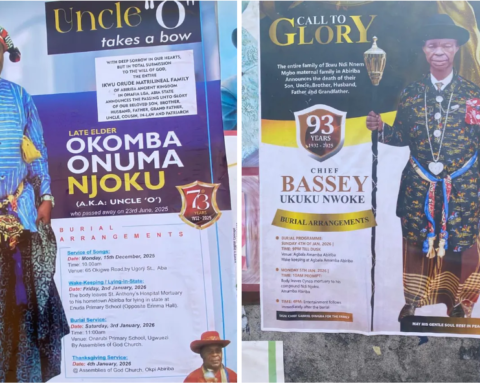By Agbeze Ireke Kalu Onuma, AI-KO
“Joy is the simplest form of gratitude.” – Karl Barth
It’s a quiet Sunday afternoon, the rain appears to be brewing for a downpour, and I find myself sifting through the ordinary rhythms of the day and my days. The question popping up is, about habits – those repeated actions woven into our lives like threads in cloth.
Honestly? Many of mine feel functional: morning prayers, walks, reading. Necessary, grounding, but not radiating that deep, warm light we call joy. Then I think of the moments when my spirit truly hums – not when I achieve something grand, but when I witness a small spark ignite in someone else’s eyes. When a spontaneous act of care, a word offered at the right time, or a practical gesture shifts the weight on another’s shoulders. That’s the habit I return to like a favorite path: creating space for others to feel seen, supported, and strengthened – especially when they least expect it. It’s not a scheduled charity. It’s the instinct to pause, listen deeply, and offer what’s needed – a connection, a resource, a reminder of their worth. This isn’t about heroism. It’s about noticing the person beside me in life’s marketplace and choosing to share my shade.
This impulse feels deeply rooted in the soil of my upbringing. I grew up watching communal life in action – the communal compound and village square where stories were exchanged, burdens shared, and celebrations multiplied. The principle of being your brother’s keeper wasn’t a slogan; it was the air we breathed. I remember my mother, after a long day, after a long walk from the Farm, tending her crops, would still find the energy to help her neighbors if she saw them struggling. No fanfare. No expectation of return. Just a quiet transfer of strength. “When one hand washes the other,” she’d say, “both become clean.”
That image stayed with me: kindness as mutual cleansing, an act that refreshes both giver and receiver. I saw how a shared bowl of soup could mend a frayed spirit, how lending a hoe for an hour could save a family’s planting season. These weren’t grand deeds. They were small, intentional acts of seeing and responding. They taught me that true strength lies not in standing alone, but in ensuring no one around you collapses.
There’s a sacred echo here, resonating through Scripture. Jesus didn’t just preach love; He lived it in startlingly practical, spontaneous ways. He saw Zacchaeus hidden in a tree and invited Himself to dinner, restoring a man’s dignity before a judging crowd (Luke 19:1–10). He noticed the woman with the hemorrhage pressing through the crowd, calling her “Daughter” and healing her in the midst of chaos (Mark 5:25–34). He washed dusty feet the night before His death, a menial task revealing divine love (John 13:1–17). These weren’t scheduled appointments in His ministry planner; they were interruptions He welcomed as holy assignments. The Apostle Paul urged believers to “carry each other’s burdens,” fulfilling Christ’s own law of love (Galatians 6:2). This burden-bearing isn’t just physical; it’s emotional, spiritual – the weight of doubt, fear, or loneliness. When I offer a genuine “How are you really?” to my subordinates and wait for the answer, or when I spontaneously take on extra tasks for others so they can tend to a more pressing personal needs, I’m mirroring that divine attentiveness. It’s participating in God’s own habit of noticing the overlooked.
The joy that follows isn’t pride; it’s the quiet thrill of aligning with a Love and with something far greater than myself. It’s the echo of Christ’s words: “It is more blessed to give than to receive” (Acts 20:35). The blessing is the joy itself – a deep, soul-level satisfaction.
Stoic wisdom offers a surprising parallel. Epictetus taught that our true power lies not in controlling events, but in our response to them. Applying this to kindness means recognizing that while I cannot fix every problem or erase all pain, I can always choose my posture toward the person in front of me. I can choose presence over distraction, empathy over indifference, generosity over self-protection.
Viktor Frankl, drawing from his harrowing Holocaust experience, wrote that even in suffering, we retain the “last of the human freedoms – to choose one’s attitude in any given set of circumstances.” Choosing kindness, especially spontaneously, is exercising this ultimate freedom. It’s defying the world’s numbness. It’s declaring that this moment, this person, matters. This habit isn’t naive optimism; it’s a disciplined commitment to look beyond my own agenda and perceive the human need within reach. The joy springs from that act of deliberate, liberating choice. It’s the freedom found in focusing outward, dissolving the walls of self-concern.
How does this habit unfold in my daily life? It is when recently I paused a hectic work to truly listen to a friend’s unspoken anxiety, offering not solutions but the gift of unhurried attention. It is when I anonymously coverd a strangers lunch debt after overhearing their quiet shame at the cafeteria counter. It could be sending an unexpected note of affirmation to someone whose light seems dimmed, detailing the strengths I genuinely see in them. Crucially, it’s the spontaneity that unlocks the joy.
Planning kindness is good, but the unexpected gesture carries a unique power – like rain on parched earth when no clouds were forecast. It whispers, “You were seen. You are valued. You are not alone.” The joy comes not just from their smile (though that is sweet), but from the profound sense of connection forged. It’s participating in something eternal – the flow of divine love through human hands. It reminds me I’m part of a vast, interconnected whole, where lifting another doesn’t diminish me but expands the light we all share. This habit is my rebellion against isolation, my small way of stitching the torn fabric of community back together, one intentional, unexpected thread at a time. It transforms ordinary moments into sacred encounters, filling my own cup as I pour out for others.
On Habits of Joyful Kindness:
“Too often we underestimate the power of a touch, a smile, a kind word, a listening ear, an honest compliment, or the smallest act of caring, all of which have the potential to turn a life around.” – Leo Buscaglia
“Kindness in words creates confidence. Kindness in thinking creates profoundness. Kindness in giving creates love.” – Lao Tzu
“Therefore encourage one another and build each other up, just as in fact you are doing.” – 1 Thessalonians 5:11
“The heart that gives, gathers.” – Tao Te Ching
“The Japanese art of Kintsugi repairs broken pottery with gold lacquer, believing the cracks make the piece more beautiful. Your spontaneous kindness is the gold that mends the unseen fractures in the human spirit.” – AI-KO
“Forget yourself for others, and others will never forget you.” – Sri Sathya Sai Baba
“We rise by lifting others.” – Robert Ingersoll.
Follow us on all social media platforms @dailyquery for news and analyses around the globe.



























